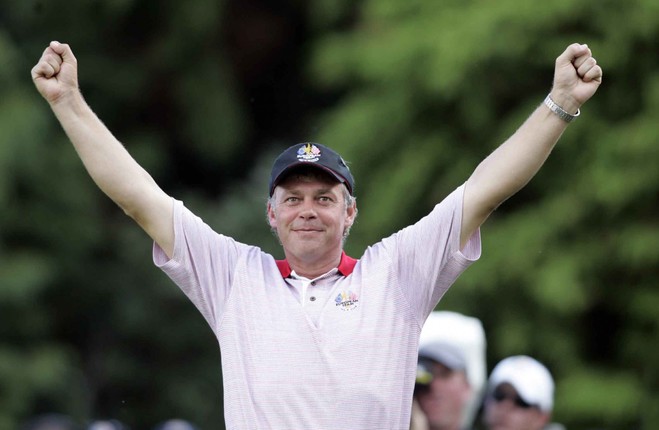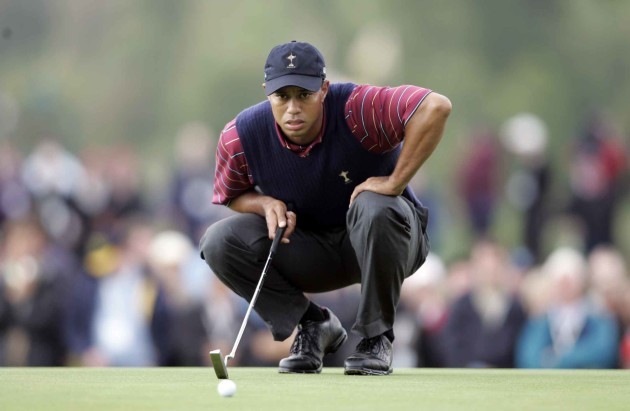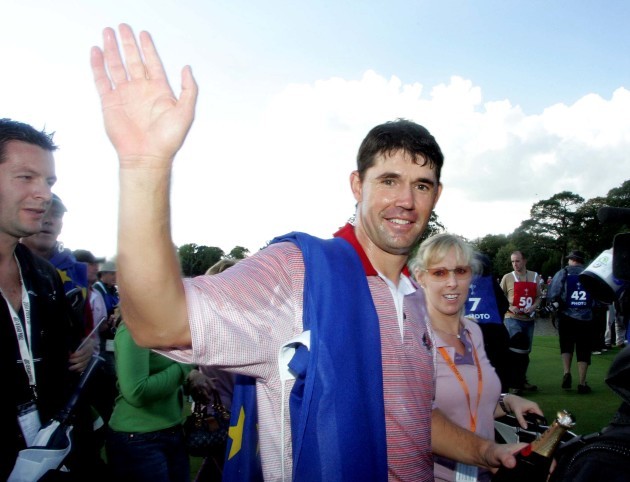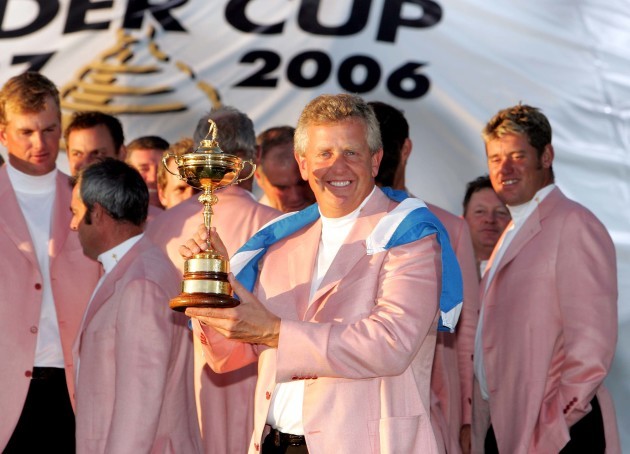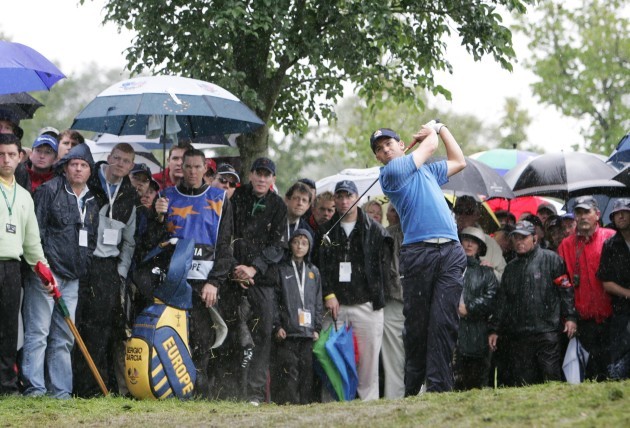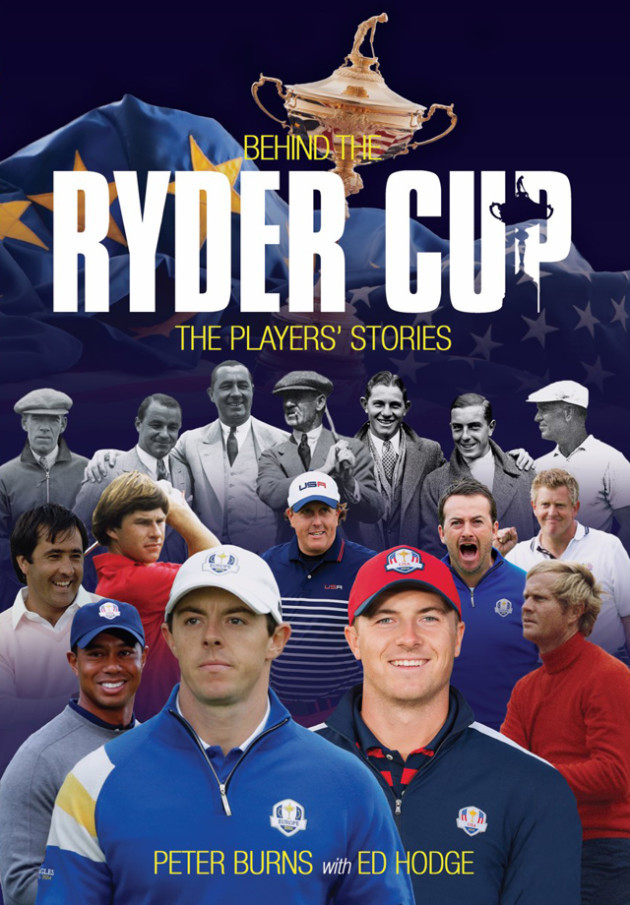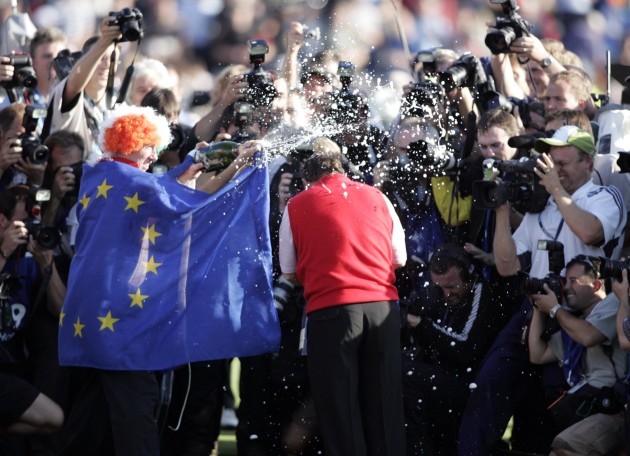THE FOLLOWING PASSAGE is an extract from Behind the Ryder Cup.
Ireland played hosts to the Ryder Cup for the first time in 2006 at the K Club in County Kildare.
The visiting team was captained by Tom Lehman and featured household names Chad Campbell, Chris DiMarco, Jim Furyk, Phil Mickelson, David Toms and Tiger Woods with rookies JJ Henry, Zach Johnson, Vaughn Taylor and Brett Wetterich and wildcard picks Stewart Cink and Scott Verplank.
European captain Ian Woosnam’s wildcard picks were Lee Westwood (much to the chagrin of the overlooked Thomas Bjørn) and Darren Clarke, whose wife Heather had tragically died just three weeks before after a two-year battle with cancer. Clarke declared that Heather would have wanted him to compete and vowed to repay Woosnam’s faith in him. Alongside these two experienced campaigners there was a very familiar feel to the rest of the team with Paul Casey, Luke Donald, Sergio García, Pádraig Harrington, David Howell, Paul McGinley, Colin Montgomerie and José María Olazábal all returning alongside first-timers Robert Karlsson and Henrik Stenson. With Clarke at the epicentre of the team, the thirty-sixth Ryder Cup looked certain to be an emotional affair.
Darren Clarke: A few days before Heather passed away she said to me, ‘If Woosie calls you, you have to play.’ But when the call came through I had to take a few days to think about it. I was obviously going through a lot of turmoil at the time and my first thought was for my two young boys and whether they could handle me going away to play for that week. And I also had to think about whether I could contribute to the team because I didn’t want to go there and just get a load of sympathy; I wanted to go there and be a proper part of the team and contribute to our effort. So there was a lot to think about; but I eventually decided, yes, I could do this.
Tom Lehman: The Ryder Cup is everything golf should be. It’s pride, it’s passion, it’s emotion, it’s nationalism. It’s competition in its purest form. I’ve been on winning Ryder Cup sides and I’ve been on losing Ryder Cup sides. Let me tell you, it’s much more fun when you win. Much more fun.
Tiger Woods: I’ve been under different captains with different philosophies and personalities, I think Tom is probably right in the middle. He’s not as fiery as Hal Sutton but certainly not as conservative as Tom Kite, though they were both competitive and wanted to win just as much as we all did. He was one of the spearheads at Valderrama and one of the leaders in the locker room at Brookline, so he had all the experience necessary to be a great captain.
Tom Lehman: We had four rookies in the US team that year in Zach Johnson, JJ Henry, Vaughn Taylor and Brett Wetterich, and Chad Campbell and Chris DiMarco had only played in one Ryder Cup before. But I wasn’t too worried about that beforehand. Nick Faldo was a rookie in the Ryder Cup once upon a time. So was Seve Ballesteros. So was Jack Nicklaus. Everyone has to start somewhere.
I love being part of a team and I have always had a huge passion for the Ryder Cup. While my career may not have been as wonderful as other guys, I go back to five key career goals that I set for myself and not many guys can say they were number one in the world [in 1997], or PGA Player of the Year or won the Vardon Trophy.
Sometimes you can never dream big enough and captaining the Ryder Cup team was an honour beyond my wildest dreams. I consider the Ryder Cup to be the ultimate golfing experience, even greater than winning the Open. I’m not sure we fully understand how important it is to the European players. I know it’s important to us, that the guys are happy to be part of the team and that they get very nervous and uptight, which I think is a problem. My thing from the beginning was this: the goal should not be to be on the Ryder Cup team; the goal should be to be on the winning Ryder Cup team.
Colin Montgomerie: If there was a team I was on that was the best, quality-wise, it was 2006. Our rookies were Stenson, Karlsson, the picks were Clarke and Westwood and we had just a fabulous, fabulous team in 2006. It was the best team I played on.
It was in Ireland and very emotional because Darren Clarke lost his wife a month beforehand. Darren was picked ahead of Thomas Bjørn and being Irish in Ireland, the first time the Ryder Cup had been played there, it was a very emotional time, but at the same time, it was a team that just couldn’t lose. The Irish fans were phenomenal, the whole country just stopped for the Ryder Cup.
Darren Clarke: Being part of that team did a lot for me, especially seeing how much people cared for me and cared for Heather. There are too many memories for me to list, but my teammates and the American players were wonderful to me.
I tried to get myself into good shape when I finally arrived and it paid off. Woosie had been really supportive of me and he was a great captain. 2006 was my fifth Ryder Cup and the first time I had been picked. It was good to know that Woosie held me in high enough regard to give me one of the two places that were available to the captain.
The minute we got to the K Club the atmosphere was fantastic. There was instant camaraderie. I hadn’t seen a few of the guys and their partners since Heather passed away and they all had hugs and kind words for me. Meeting my teammates and just getting into the style of things was quite settling, but I would not have been there at all had I not thought I could carry it off, on the course particularly, but also off it. Nevertheless, it was nice to feel the genuine warmth and kindness of everybody around me.
Tom Lehman: Having Darren there meant a great deal, to him personally and to his teammates, as well as to the US team and all the fans. I think having him part of it made that Ryder Cup significantly better. When it comes right down to it, we’re all human beings, and whether or not we were playing in the Ryder Cup, you saw a man who had had a tragedy like he’d had to go through and you had an incredible amount of empathy for him.
Darren Clarke: Tiger had lost his father and Chris DiMarco his mum, so the Ryder Cup was not life and death. There were more important things than trying to win, but we were all professionals and wanted to win for our teams. As friendly as we were with the Americans, we would want to kick their butts as much they would want to redden ours.
Tiger Woods: Darren being there was an inspiration in itself and his play that week was remarkable.
Having performed so well as a duo at Oakland Hills, Woosnam once again paired Montgomerie and Harrington to lead the Europeans into battle. Lehman countered by sending out Woods and Furyk to meet them head on. Where the chemistry between the ‘dream team’ of world number one Woods and world number two Mickelson had failed so spectacularly in Detroit, Lehman decided to keep them apart in Ireland and instead looked for an almost as compelling combination of the world number one and world number three working in tandem. With a potentially epic opening fourball about to kick-start the 2006 Ryder Cup, the atmosphere as the players arrived at the first tee was electric.
Colin Montgomerie: That walk onto the first tee is something I will never forget. It made the hairs stand up on the back of my neck. It even got to Ivor [Robson, the starter] who announced, ‘Welcome to the foursomes,’ instead of fourballs. He was so nervous he said the wrong thing.
Tom Lehman: I hate that ‘Olé, olé, olé’ song because the Europeans sing it when they are winning, but I have to admit that without it, the Ryder Cup wouldn’t be the same.
Colin Montgomerie: I was paired with Pádraig Harrington in the first match against Woods and Furyk. We knew they would be an incredibly tough pair to beat but we also knew what an impact we had had two years earlier when we had won the opening match against their top pairing. The crowd throughout that encounter were absolutely incredible, the atmosphere was very, very intense.
Ian Woosnam: I wanted us to get off to a fast start and so I picked Monty and Pádraig to go out first and lead from the front. There was a great moment when the matches started with the crowd going wild, but then everything seemed to go in a bit of a blur after that.
Colin Montgomerie: It wasn’t a brilliant start for us as we lost the first hole. We got things back to all square on the fifth, went one up on the seventh, but were then pulled back again on the eighth. They then got into their groove and pushed ahead to go three up at one point and Pádraig and I had to work very hard to reign them back in. We won the fourteenth and sixteenth but just couldn’t pull back that last point.
We wanted to lead off and give the team a good start, but disappointingly they just edged it at the end for that one-up victory.
First blood to the US, and what an important point it was for the team after the humiliation at Europe’s hands two years earlier. Had a line been drawn in the sand?
If Woosnam had hoped to get the board moving in the second match, which pitched Casey and Karlsson against Cink and Henry, he was only partly satisfied when the match was halved. Europe at least had something to their name, even if Casey and Karlsson had let a three up lead slip between the eleventh and fourteenth, and had even been one-down after the fifteenth before making matters even at the sixteenth and holding on for the draw.
The third match saw García and Olazábal take on Toms and Wetterich. The Spanish duo won the first hole and held the advantage for the rest of the match, never once conceding the lead, on their way to a comfortable 3&2 victory that registered the first full European point. Their enthusiasm for the event was all in plain evidence as García milked the applause on the first tee and then rode the wave of exuberance for the next sixteen holes. His energy was infectious and would provide a focal point around which the rest of his team could gather.
One of the biggest questions for Woosnam coming into the Ryder Cup was whether Clarke would be able to deal with the deep emotion of the event so soon after losing his wife. He could either try to protect the Northern Irishman from the public glare or let him go out and embrace it. The Welshman decided that to deal with it head on was the best way forward and he threw Clarke into the mix in the last of the morning fourballs, pairing him with his old friend Westwood against Mickelson and DiMarco.
Darren Clarke: I knew that the first hole I played would be the toughest thing I’d ever faced on a golf course. I wasn’t wrong. When we walked onto the tee the roar was unbelievable. It was a wall of sound. I just looked up at everybody and nobody and said, ‘Thank you.’
Phil Mickelson and Chris DiMarco came on to the tee 30 seconds later and they both gave me hugs and said, ‘Darren, it’s fantastic you’re here.’ It was above and beyond what they had to say and do. If I can have two guys like Phil and Chris giving me a hug on the first tee, that’s what the Ryder Cup is all about.
I stood over the ball and the noise of the crowd was just beating through me. To be honest, I actually have no idea how I hit the ball. I think it actually helped that I had watched Tiger shank his first shot into the water earlier that morning. That made things a lot easier – if the number one player in the world hooks his ball a hundred yards into the water, what was the worst that could happen to me?
Having Lee Westwood there with me made it an awful lot easier; it wasn’t easy, but to have a friend like that by your side made a huge difference. But at the same time he wasn’t that helpful because while I was standing there, terrified because I had no idea if I was going to be able to hit the ball, whether I might top it or shank it or whatever, that soft twat was standing there crying beside me!
But I knew I had to stand up and be counted. I had to get through it. That was my focus. Somehow I managed to flush it straight down the middle. Then I nearly holed the approach. I had a fifteen-foot putt and I knew, I just knew, that I was going to hole it. I’m sure that Heather was with me that entire week. She was looking over me on the first tee, on the first green. I’m convinced she was there – just watching out for me. I sunk the putt.
Lee Westwood: What Darren had been through was tragic and it was always going to be an emotional time for him. That first tee was so tough. Me, Phil Mickelson, Chris DiMarco, the caddies, Ivor Robson – we were all in tears. Then Darren steps up, hits a driver down the middle, knocks the approach to fifteen feet and holes it for a birdie. Amazing. We won the match one-up.
With a one-point lead at lunchtime, Woosnam sent out Harrington and McGinley as his first pairing in the foursomes, while Lehman countered with a combination of Campbell and Johnson. They were followed onto the course by Howell and Stenson who took on Cink and Toms before Westwood and Montgomerie faced Mickelson and DiMarco. In as closely poised a set of matches as you can imagine, all three were halved.
Colin Montgomerie: Darren was supposed to play with Lee Westwood in the afternoon of the first day, and I was supposed to be rested. But Darren finished his morning match with Westwood in a very emotional state and couldn’t play that afternoon. I was finishing lunch when I got the message, ‘Monty, you’re on.’ Darren was just too emotional to play. I went out with Westwood in the afternoon and managed to get a good half; it was for Darren. It was all for Darren.
Ian Woosnam: Our big concern with Darren, and why we rested him for the afternoon sessions, was because it was emotionally draining, obviously, and very tiring. It was tough for him but he did a great job.
In the final match of the day, García and Donald paired up to take on Woods and Furyk and the young Spaniard was once again in wonderful form as he continued where he had left off in the fourballs. In a repeat of the morning session, the Europeans took the initative at the first hole to go one up. They played brilliantly to only be drawn back to all square on four holes and were never once in arrears. The most outstanding piece of play came on the sixteenth when García was presented with a difficult lie on woodchip and with a shot across the water; he lofted his shot to perfection and landed the ball fifteen feet from the hole, which Donald then coolly sank for birdie. They would ultimately secure a two-hole victory.
Colin Montgomerie: Each of the first three foursomes were halved, so all attention then turned to Donald and García, who made a brilliant fist of winning at the last against Woods and Furyk. Europe had lost only one match all day (Pádraig’s and mine) and the 5–3 scoreline made for a happy team room that evening.
The first of the Saturday fourballs continued the trend of close matches as Casey and Karlsson battled to a half with Cink and Henry. The Americans looked as if they might have won the match on the sixteenth when Henry eagled the par-five to go one up, but Casey kept his cool on the eighteenth to sink a fifteen-foot putt for birdie which drew things level.
García and Olazábal teamed up once again to face DiMarco and Mickelson in the second match of the morning and continued their rich vein of form with a 3&2 win. Clarke and Westwood then beat Furyk and Woods 3&2 with the world number one looking completely out of sorts throughout the round.
Darren Clarke: The next day had a similar pattern to the first – I played in the morning with Lee against Tiger and Furyk and had the afternoon off.
When you see Tiger across the tee, it’s not intimidating, just thrilling. If you can’t get up for playing the game against the best, you might as well retire. On the Saturday, as it turned out, he had a really, really off one, and we weren’t complaining. Lee and I played really well. You never want to beat the best player in the world on one of his off days, but when it comes to the Ryder Cup, you take whatever you can.
Tiger Woods: There is often a perception that the Ryder Cup doesn’t mean as much to the US players as it does to the Europeans. That’s not the case at all. Not at all. It’s just that we haven’t tended to play as well as they have. We certainly haven’t putted as well. Any match play event comes down to putting. Our team putted great at the Presidents Cup in 2005, for example, and we won. It’s as simple as that.
Verplank and Johnson secured America’s only full point of the morning session in the final fourball, beating Stenson and Harrington 2&1 to take the score to 7½–4½ at lunch.
García and Donald led the way for the Europeans in the afternoon, taking on Mickelson and Toms in the opening foursome and dovetailing brilliantly once more in a 2&1 victory.
Colin Montgomerie: Lee and I teamed up in the afternoon as we had the day before, and we halved the second match out, this time against Chad Campbell and Vaughn Taylor. I hadn’t played in the morning fourballs but it did not bother me in the least. I didn’t feel like it was a case of being ‘dropped’; it was more to do with our team being the strongest Europe had ever assembled. Woosie had so many options. Four of us had to miss the morning session and I just happened to be one of them.
Lee had a 20-footer on the last to win and to this day I don’t know how Lee’s putt missed. It was incredibly close and it meant we took a half instead of the full point, which was unfortunate. We should have beaten them, but it had been a great game against two of the soundest of our opponents. They might not have been household names but they were very, very decent players.
The third match out saw Casey and Howell take on Cink and Johnson and the Europeans won comfortably 5&4, thanks in part to a sensational hole-in-one from Casey at the fourteenth.
Ian Woosnam: As a captain your job is to just try and get the best out of each of your players and offer some advice. Like I remember saying to Paul Casey at the fourteenth, ‘Just try and get past the hole a little bit on your drive because that gives you an easier putt and everyone else has been coming up short.’ So he did that – and he drained it for a hole-in-one. Paul was so pumped up all that week, he was tremendous. And the crowd just went berserk when that happened, and the energy transferred through the whole team.
Paul Casey: David Howell and I had played some wonderful golf that day, but we were pretty lucky in some respects because Zach Johnson wasn’t putting as well as he normally putted, and that just led to a situation that we were dormie walking onto that hole. It was damp and pretty cool and we knew that we wanted to close the match off at that next hole. I chose a four-iron, aimed a little bit right and just absolutely laced this thing. I was just trying to get it near the flag so that we could hopefully halve the hole in threes and be done with the match. And when the ball set off to the right of the flag, turning over, I remember thinking, ‘That’s a good-looking shot . . .’ I’m not tall enough to see the bottom of the flag, and the reaction from the crowd kind of said it all because they erupted when it hit the green; the fact it released and trickled in at the speed it did was almost like slow motion and so there was a brief lull from the crowd followed by a huge roar, so I knew it had gone in. It was just a moment of pure shock followed by pandemonium on the tee.
It was a bit of a weird feeling because the other guys didn’t even get to hit and so I was a bit sheepish and apologetic when I turned around and shook hands to thank them for the game.
Zach Johnson: Scott Verplank and I were paired for the last fourball match of the day against Henrik Stenson and Pádraig Harrington. It was a horrible cold, wet, windy day and the rest of the team were struggling, so Scott and I knew we had to try and pull a point out of the bag so that we had some hope to cling to that night.
Scott Verplank: Our team that year didn’t have a whole lot of confidence but Zach and I did. He’s a pretty good example of your mind being stronger than your body. That was the best Zach had ever played in his life to that point. He just believed he was going to do great things, with nobody else understanding why he would think that. I played pretty well but he made seven birdies and we won 2&1. He was unbelievable.
I guess we’re kindred spirits. When we see each other now, we give this goofy little fist pump to the heart that we did in Ireland. But we look each other in the eye when we do it, and it’s like, ‘Yeah, that’s who we are.’
Darren Clarke: At one stage it looked like we were going to win all four foursomes, but it didn’t quite work out that way. We’d still won the series, which made it four out of four – all four series had been won 2½–1½ – and we needed only another four-and-a-half points to win the cup for the fifth time in six matches.
Woosie chose Monty to lead us out in the singles. We all wanted him out there as our number one and just as in 2002 at the Belfry, he made sure there were blue numbers on the scoreboard early on and even though we weren’t meant to be looking at the boards, you could tell from the cheers around the course that we were ahead in the early games.
In 2004 he and Pádraig gave us the perfect start when they beat Tiger and Phil Mickelson in the top match on Friday morning, and Monty went on to hole the winning putt on the Sunday. In 2006 he holed a great putt on the eighteenth green on Friday night to help us extend our lead, and then defeated David Toms for the second match running in the singles.
Colin Montgomerie: I wasn’t to know it at the time, but it was to be my last Ryder Cup match as a player. I’m glad it finished off the way it did. I’ve never had a walk like I did at the end of my singles match. The walk I had from sixteen to seventeen was the best walk I’ve ever had in golf. I managed to halve the sixteenth hole to remain two-up; two-up with two to play meant I couldn’t lose and it was a record I was very proud of – I played eight times in singles and never lost a singles match.
I was never really interested in the personal aspect of the Ryder Cup, it was always for the team, but that was a walk of personal pride from sixteen to seventeen. It was a long walk around the river Liffey, about 300 yards. To stand on that seventeenth tee and be able to hit it anywhere and for it not to matter was wonderful. I was certain that we were going to win the Ryder Cup and I knew I wasn’t going to lose.
Toms birdied seventeen and I managed to birdie the last, and he did as well, but I managed to get that birdie on eighteen and finished with a victory.
Sergio García was second in the order against Stewart Cink, but the Spaniard was unable to continue his previously irresistible form and fell to a convincing 4&3 defeat.
Stewart Cink: It was a great match-up for me. Not only a great match, but a great match-up for me, because I really wanted to be in the role of having to do something to help the team out, and I was the second match off. I don’t remember exactly how many points we trailed by, but we needed to have a serious run. The first couple of matches were so important, and for me to be right there against their best performer of the week was something I relished, and to perform well myself and win that match was great, so good for my confidence. I just wish it would have done the team better in the end. Just our hole was too deep.
Darren Clarke: Paul Casey then played Jim Furyk; Paul knew he was facing one of the strongest players in the US side, and one who had never lost a singles before. Paul got ahead early on but Jim never backed off and played brilliantly on the inward nine, including an eagle at the sixteenth, to take the match to the penultimate hole. The pair shared eight birdies and an eagle on eight holes on the back nine. Throughout, Jim looked grimly determined, stony-faced and was clearly never going to give up, but Paul hung in there and managed to win 2&1. We only needed another two-and-a-half points at that stage.
Karlsson was out next and he had the tough task of taking on Woods, who was determined to make amends for his poor form from the day before. Although Karlsson went one up with a birdie on the first, Woods reeled him back in on the second and then moved ahead on the fourth. There was a moment on the seventh when Karlsson might have questioned whether the omens were going to fall in his favour when Woods lost his nine-iron into the lake, but it was a false promise as the world number one moved comfortably through the gears to secure a 3&2 victory.
Tiger Woods: I lost my nine-iron into the lake at the seventh green. The ball was muddy so I handed it to Stevie [Williams, his caddie] and he was going to rinse it in the lake and the nine-iron as well. He was dipping the towel in the water and slipped on a rock. It was either him or the nine-iron going into the water and he chose the nine-iron!
Donald and Campbell were playing just behind Karlsson and Woods and the Englishman played some lovely golf en route to a 2&1 victory, finally turning up the heat on his opponent when he won the eleventh, twelfth and thirteenth to go three up having halved the previous ten holes. Campbell fought back by winning the fifteenth and sixteenth but a bogey on the seventeenth put paid to any thoughts of a consolatory half.
At eighth in the order, the hero of 2002, McGinley, faced off with Henry and although the Irishman started strongly to move two-up after three the American rookie fought hard to bring the match all square on the thirteenth, which is how the score remained as they halved the final five holes.
Clarke, the hero of the week, was out next against Johnson. Unsurprisingly, his was a match that every spectator was desperate to watch.
Zach Johnson: When I saw that I was going to be up against Darren Clarke in the singles, I expected it to be loud, but it was like an 80,000-people stadium amassed around one tee box. It was pretty remarkable. Frankly, it was like that on every tee box for him.
As the scoreboard started to show blue after blue after blue, the result seemed no longer in question, but rather which of the Europeans it would be to sink the winning putt.
Darren Clarke: It was all a bit of a blur and I remember wondering if it might come down to me to win the cup – but Henrik and Luke were also in good positions and it could have been either of them.
I hit a good drive down sixteen, but neither of us could reach, so both had to lay up. I hit it onto the green – a twenty-five-foot downhill, fast and left to right. Zach hit a good shot, but it spun back and he had an uphill chip, closer than mine.
As we walked round past the big stand, everybody in it was standing up, roaring and shouting. I was trying to keep my head in check, but I was struggling.
I hit my putt and, although it was a very fast one, I left it about two feet short. I started to wonder how I was going to get it into the hole. My mind had gone. Everything was coming into my head. I had a two-footer to win my game, possibly the Ryder Cup in Ireland, my first ever singles win, and my wife’s not there. I honestly didn’t think I could hit the putt.
It was then that one of the most magnanimous gestures in Ryder Cup history occurred. I’m not sure if Zach realised my predicament but he was not going to put me through any more turmoil. He walked round, picked up my marker and the match was over. It was an unbelievable gesture to do that in his first Ryder Cup. I will never forget that.
Zach gave me a hug, and when I turned to Billy [Foster, his caddie], I just couldn’t hold it back any more. Everything came flooding out. I was a mess. I had done what I had to do. The whole week had been a success, in Ireland, and Heather wasn’t there. I couldn’t hang on any more, the floodgates opened.
Ian Woosnam: At the beginning of the week if someone had asked me if I believed in destiny, I’d have said no. But when I stood on that sixteenth green seeing Darren finishing off his match it changed my mind; that week was destiny for Darren and for Heather. That was why we dedicated the win to her. And what a Ryder Cup he had – three matches and three wins. Incredible.
As it transpired, it was not Clarke who sank the winning putt as, just moments before, Donald had secured his victory over Campbell and Stenson defeated Taylor 4&3.
Ian Woosnam: There have been a few debates as to who won it, but we’ll put it down to Stenson. At the end of the day, it’s a team effort and it was just fortunate that it came down to Henrik. He’s going to remember that moment for the rest of his life.
As the rest of the matches came down the home straight, the momentum remained very much with the Europeans. Howell defeated Wetterich 5&4, Olazábal defeated Mickelson 2&1 and Westwood won two-up against DiMarco. Verplank, playing in the final match against Harrington secured a consolation point for the US with a 4&3 victory that included America’s first ever hole-in-one, but it wasn’t enough to save his team from another heavy defeat at the hands of the Europeans.The final score of Europe 18½, USA 9½ mirrored that from Oakland Hills two years previously.
Tom Lehman: Our team came ready, but maybe we weren’t quite ready enough. Our problem, I believe, is that deep down inside, the American players believe more in individual achievements. There’s a part of us that believe we’ve always had the stronger team, man against man. Therefore, if you lose, it doesn’t change that Tiger Woods is still the best player in the world. I’ve talked to some guys who have said, ‘Yeah, maybe there’s some truth to that mindset.’ That attitude needs to be changed. Who cares what we’re ranked? We need to want to win as badly as they do. It’s as simple as that.
Colin Montgomerie: He’s a lovely guy Tom Lehman and I think he did a great job. There are two guys who I think did a great job and lost and they were Tom Kite in ’97 and Lehman in 2006. And that’s why I feel for the captains because you can do a great job, but there is no grey in the Ryder Cup. You win or you lose – and if you lose you are opened up to everything and if you win, you’re bulletproof. If you lose everything comes out – your relationship difficulties with the players, your relationship with the press, everything is picked apart. Look what happened to poor Tom Watson in 2014. No one now remembers that he won the thing as captain in 1993. He is remembered as a losing captain who was doddery and out-of-touch, which is grossly unfair on the man, especially one of his stature. But that’s the way the Ryder Cup is. It can be brutal.
We had a great team, and a bit like Seve’s, it was all set up for us; Ireland was as passionate a time as we’ve ever had and we weren’t going to lose. Woosie just had to direct traffic, really. I’m not dismissing his role, but he had the best team that I played in – and he did a good job in directing traffic, because you still have to direct it, and he was super.
Afterwards, with the party having moved into the team room, there was a knock on the door. It was the US team who had come to congratulate us on our victory. It was a fabulous thing for them to do and not a common occurrence at a Ryder Cup. In 2010, Corey Pavin and his vice-captains made an appearance and had a drink with us, but I would not have expected the rest of his players to have done so.
But 2006 was different because of what Darren had been going through. That’s why the Americans, to a man, all came down to support him.
Throughout the entire match, the Americans had been superb. From Tom Lehman and Tiger Woods down, each of them had rallied around Darren, helping whenever possible to make him feel comfortable. Golf is a close community and for one of its members to lose his wife in the way Darren had lost Heather had a huge impact on everyone.
All credit to each and every one of that visiting side; they were gentlemen. The integrity of the Ryder Cup was fully restored.
Graeme McDowell: I didn’t make the team at the K Club, and I was dearly disappointed but I did a bit of commentary for RTE and some radio work for the BBC and I managed to get into the party on the Sunday night after the boys had won and, as you can imagine, that was one hell of a piss-up. David Howell fell off a piece of furniture that night – I think it was a €100,000 antique table that he was dancing on top of and he fell off.
Peter Baker: There were hundreds of thousands of pounds of antiques knocking around the K Club. And just before it really kicked off, I remember some of the staff taking the antique tables out and putting them away safely, just in case. And then we just got absolutely hammered.
Colin Montgomerie: The 2004 team of Langer’s was building up to that team of Woosnam’s, it was the best we’d had. Stenson and Casey were at the top of their game; I was back to number one in Europe; García, Olazábal, it was extraordinary. And the scenes at the sixteenth at the end were just wonderful and something I will always remember. The mud of Ireland. The rain. It was a fantastic Ryder Cup, it really was.
Behind the Ryder Cup is published by Polaris. More info here.
